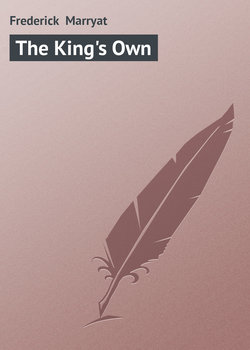Читать книгу The King's Own - Фредерик Марриет, Frederick Marryat - Страница 15
Chapter Fifteen.
ОглавлениеThat which should accompany old age,
As honour, love, obedience, troops of friends,
I must not look to have.
Shakespeare.
But we must return on shore, that we may not lose sight of the grandfather of our hero, who had no idea that there was a being in existence who was so nearly connected with him.
The time had come when that information was to be given; for, about six weeks previous to the action we have described, in which Adams the quarter-master was killed, Admiral De Courcy was attacked by a painful and mortal disease. As long as he was able to move about, his irritability of temper, increased by suffering, rendered him more insupportable than ever; but he was soon confined to his room, and the progress of the disease became so rapid, that the medical attendants considered it their duty to apprise him that all hopes of recovery must now be abandoned, and that he must prepare himself for the worst.
The admiral received the intelligence with apparent composure, and bowed his head to the physicians as they quitted his room. He was alone, and left to his own reflections, which were not of the most enviable nature. He was seated, propped up in an easy chair, opposite the large French window, which commanded a view of the park. The sun was setting, and the long-extended shadows of the magnificent trees which adorned his extensive domain were in beautiful contrast with the gleams of radiant light, darting in long streaks between them on the luxuriant herbage. The cattle, quietly standing in the lake, were refreshing themselves after the heat of the day, and the deer lay in groups under the shade, or crouching in their lairs, partly concealed by the underwood and fern. All was in repose and beauty, and the dying man watched the sun, as it fast descended to the horizon, as emblematical of his race, so shortly to be sped. He surveyed the groups before him — he envied even the beasts of the field, and the reclaimed tenants of the forest, for they at least had of their kind, with whom they could associate; but he, their lord and master, was alone — alone in the world, without one who loved or cared for him, without one to sympathise in his sufferings and administer to his wants, except from interested motives — without one to soothe his anguish, and soften the pillow of affliction and disease — without one to close his eyes, or shed a tear, now that he was dying.
His thoughts naturally reverted to his wife and children. He knew that two of these individuals, out of three, were in the cold grave — and where was the other? The certain approach of death had already humanised and softened his flinty heart. The veil that had been drawn by passion between his conscience and his guilt was torn away. The past rushed upon his memory with dreadful rapidity and truth, and horrible conviction flashed upon his soul, as he unwillingly acknowledged himself to be the murderer of his wife and child. Remorse, as usual, followed, treading upon the heels of conviction — such remorse, that, in a short space, the agony became insupportable.
After an ineffectual struggle of pride, he seized the line which was attached to the bell-rope, and, when his summons was obeyed, desired that the vicar might be immediately requested to come to him.
Acquainted with the admiral’s situation, the vicar had anxiously waited the summons which he was but too well aware would come, for he knew the human heart, and the cry for aid which the sinner in his fear sends forth. He was soon in the presence of the admiral, for the first time since the day that he quitted the house with the letter of the unfortunate Peters in his possession. The conversation which ensued between the agitated man, who had existed only for this world, and the placid teacher, who had considered it (as he inculcated) as only, a preparation for a better, was too long to be here inserted. It will be sufficient to say, that the humbled and terrified wretch, the sufferer from disease, and greater sufferer from remorse, never could have been identified with the once proud and over-bearing mortal who had so long spurned at the precepts of religion, and turned a deaf ear to the mild persuasions of its apostle.
